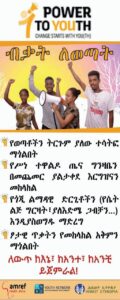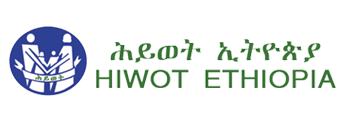Power to You(th) ብቃት ለወጣት
Power to You(th) is a five-year (2021-2026), consortium effort funded by the Dutch Ministry of Foreign Affairs.
The project will be implemented in seven districts of Amhara and Afar Regional States, led by a consortium of three organizations: Amref Health Africa, Youth Network for Sustainable Development, and Hiwot Ethiopia. The Power to You(th) project will centre youth and harness the power of adolescent girls and young women (AGYW) in achieving change to harmful practices (HPs), sexual and gender-based violence (SGBV), and poor sexual and reproductive health (SRH) outcomes, including unintended pregnancy.
The project envisions more adolescent girls and young women from underserved communities making informed choices, enjoying their sexuality, and being free from harmful practices in a gender-equitable society.
Power to You(th) has four interlinked pathways:
Pathway 1: Strengthening young people to claim civic space
Pathway 2: Strengthening Civil Society Organizations (CSOs)
Pathway 3: Changing social norms
Pathway 4: Improving policies and policy implementation
Project implementation areas:
Amhrara Region: Kewet including Shewa Robit town, Efratana Gidem including Ataye town, and Debre Berhan of North Shewa zone
Major Results Achieved by Hiwot Ethiopia
- Youth clubs established and strengthened: 20 youth clubs (8 in-school and 12 out-of-school) have well organised and prompted key PtY issues such as harmful practices, sexual and gender-based violence, and poor sexual and reproductive health outcomes, including unintended pregnancy.
- Girls’ participation in club activities enhanced: The 20 in- and out-of-school clubs were established and strengthened with 2515 adolescents and youth groups. Of which, 1304 (51%) are adolescent girls and youth. Among 51% of girls, 48% of adolescents and girls attended club leadership and decision-making.
- Knowledge and practices enhanced: Adolescent and youth knowledge on harmful practices, sexual and gender-based violence, and sexual and reproductive health, including unintended pregnancy, enhanced.
Particularly, girls’ knowledge of harmful practices, sexual and gender-based violence, and sexual and reproductive health, including unintended pregnancy, increased. They have started to demand their rights, report cases, attend their education with full confidence, and so on. - Youth networks established for lobbying and advocacy efforts: Two youth networks were established by 22 youth clubs, youth associations, and underserved youth-led CSOs. The main purpose of the network is to ensure meaningful youth participation and jointly voice or claim for their rights.
- Four CSO/CBOs have enhanced their capacity and have started promoting Power to You(th) key topics such as harmful practices, sexual and gender-based violence, and poor sexual and reproductive health outcomes, including unintended pregnancy.
- Societal actors commitment and engagement enhanced: societal actors such as youth, community leaders and elders, women groups, and government structures commitment to prevention and protection of child marriage, FGM, and other forms of harm against girls and women enhanced: As a result, cases of FGM and child marriages were properly reported and managed accordingly. For example: 37 girls (13–17 years old) arranged child marriages that were reported and cancelled in Northshewa Zone. Currently, the girls properly attend their education. 28 traditional FGM practitioners have committed to stopping FGM practices, and currently, they have joined the societal actors and community action team members to promote and protect the consequences of FGM.
3 girls who are 9–11 years old were raped at Efratana Gidim woreda/district. The perpetrators have been arrested and are under investigation. Those girls have received medical treatment, including counselling, and they have attended their education regularly. - Consensus was built with village-level community leaders, the community groups, and government partners to get rid of the cultural and gender norms. Incorporating customary practices into local community bylaws and regulations. For example, three persons who violated the agreed community rules and committed sexual violence in Caramba Kebele of Ensaro woreda have been punished as per articles in the community agreed law, and two persons who committed female genital mutilation have also been penalized.

